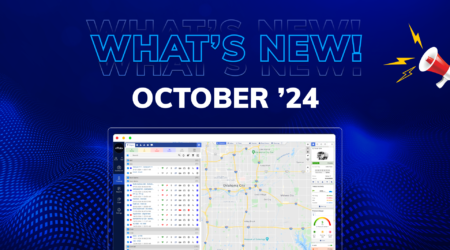Vehicle Health Monitor: Key to Fleet Longevity
In the modern world of logistics and transportation, maintaining the health of your vehicle fleet is crucial. The challenges faced by fleet managers today are more complex than ever before. With increasing competition, rising fuel costs, and stricter regulatory requirements, keeping a fleet in optimal condition is not just beneficial—it’s essential. Vehicle Health Monitors (VHMs) play a vital role in ensuring the longevity and efficiency of fleets. These advanced systems provide real-time data and analytics, allowing fleet managers to keep their vehicles in peak condition and avoid costly downtimes.
Why Vehicle Health Monitoring is Necessary
Enhancing Operational Efficiency
The logistics and transportation sectors are highly competitive. To stay ahead, businesses must ensure their fleets operate at maximum efficiency. Even a single vehicle out of commission can disrupt schedules and affect customer satisfaction. VHMs help maintain seamless operations by preventing unexpected breakdowns and ensuring vehicles run efficiently.
Compliance with Regulations
Fleet operations are subject to various regulatory requirements concerning vehicle safety, emissions, and maintenance. VHMs assist in ensuring compliance by keeping track of maintenance schedules and reporting on vehicle conditions. This not only avoids fines and penalties but also promotes a culture of safety and responsibility.
Cost Management
Managing a fleet involves significant expenses, including fuel, maintenance, and repairs. By identifying issues early and optimizing maintenance schedules, VHMs help in reducing these costs. Predictive maintenance can prevent major failures, saving both time and money. Moreover, well-maintained vehicles consume less fuel, further cutting operational costs.
Sustainability Goals
With increasing awareness of environmental impacts, businesses are under pressure to adopt sustainable practices. VHMs contribute to sustainability by enhancing fuel efficiency and reducing emissions. Regular maintenance ensured by these systems keeps vehicles running cleanly and efficiently, aligning fleet operations with environmental goals.
Extending Vehicle Lifespan
Vehicles are significant investments. Extending their lifespan through proper maintenance maximizes return on investment. VHMs ensure that vehicles are always in optimal condition, thus extending their useful life and reducing the need for frequent replacements.
Improving Driver Safety
Driver safety is paramount in fleet management. Vehicles in poor condition pose risks to drivers and other road users. VHMs help mitigate these risks by providing real-time alerts on critical issues, ensuring that vehicles remain safe to operate.
Understanding Vehicle Health Monitors
A Vehicle Health Monitor is a sophisticated system designed to track and report the condition of various components within a vehicle. By continuously monitoring parameters such as engine performance, fluid levels, battery health, and tire pressure, these systems alert fleet managers to potential issues before they become major problems.
Key Features of Vehicle Health Monitors
Real-Time Monitoring
- Definition: Real-time monitoring involves continuously collecting and analyzing data from various vehicle components as the vehicle operates.
- Functionality: VHMs are equipped with sensors that monitor critical parameters such as engine temperature, oil pressure, coolant levels, and more. This data is transmitted in real-time to fleet managers.
- Benefits: By having real-time insights, fleet managers can immediately identify and address issues before they escalate. For instance, if a sensor detects overheating, the system can alert the driver and the fleet manager, allowing for immediate corrective action to prevent engine damage.
Diagnostic Trouble Codes (DTCs)
- Definition: DTCs are codes generated by the vehicle’s onboard computer (OBD) when it detects a malfunction or issue in one of the vehicle’s systems.
- Functionality: VHMs can read these codes and translate them into understandable information. They often categorize the codes to indicate the severity and type of issue.
- Benefits: This feature allows fleet managers to pinpoint specific problems quickly. For example, if a vehicle reports a DTC related to the fuel system, the manager knows exactly where to focus diagnostic efforts, reducing time spent on troubleshooting.
Predictive Maintenance
- Definition: Predictive maintenance uses data analytics to predict when a vehicle component is likely to fail.
- Functionality: VHMs analyze historical and real-time data to identify patterns that indicate wear and tear or imminent failure. They use algorithms to predict the remaining useful life of components.
- Benefits: By predicting failures before they happen, fleet managers can schedule maintenance during convenient times, avoiding unscheduled downtime. For instance, if data shows a pattern of brake wear, the system can alert managers to service the brakes before they fail, enhancing safety and reducing costs.
Historical Data Analysis
- Definition: Historical data analysis involves examining past data to identify trends and patterns over time.
- Functionality: VHMs store extensive data logs that can be reviewed to track the performance and health of each vehicle component over time. This includes data on fuel efficiency, part replacements, and past issues.
- Benefits: Analyzing historical data helps in optimizing maintenance schedules and identifying recurring problems. For example, if historical data reveals frequent issues with a specific part in a particular vehicle model, the fleet manager can adjust maintenance protocols to address this proactively.
Remote Diagnostics
- Definition: Remote diagnostics allows fleet managers to access vehicle health data and diagnostic information from a remote location.
- Functionality: VHMs transmit data via cellular or satellite networks, making it accessible through web-based platforms or mobile apps. Managers can view real-time and historical data, receive alerts, and even run diagnostic tests remotely.
- Benefits: Remote diagnostics are particularly useful for fleets spread over large geographic areas. Managers can monitor and manage the health of vehicles without being physically present, leading to faster response times and reduced downtime. For example, if a truck breaks down in a remote area, the manager can remotely diagnose the issue and decide whether it can be fixed on-site or if a tow is necessary.
Implementing these features in your fleet’s Vehicle Health Monitoring system can lead to significant improvements in efficiency, safety, and cost savings. For more information, you can explore and look upon solutions, which offers a comprehensive solution tailored to modern fleet needs.
Benefits of Using Vehicle Health Monitors
Enhanced Safety
One of the primary benefits of using VHMs is improved vehicle safety. By monitoring critical components, VHMs help in identifying potential issues that could lead to accidents or breakdowns. This proactive approach to maintenance ensures that vehicles are always in safe working condition.
Reduced Downtime
Unscheduled downtimes can be costly for fleet operations. VHMs minimize this by providing early warnings of potential failures. Fleet managers can schedule maintenance during off-peak hours, ensuring that vehicles spend more time on the road and less in the workshop.
Cost Savings
Regular maintenance and timely repairs can significantly reduce operating costs. VHMs help avoid expensive repairs by catching issues early. Additionally, optimized maintenance schedules based on actual vehicle condition can extend the lifespan of components, further reducing costs.
Increased Fleet Longevity
By maintaining vehicles in optimal condition, VHMs contribute to the overall longevity of the fleet. Vehicles that are well-maintained are likely to last longer, providing better return on investment.
Better Fuel Efficiency
VHMs can monitor and report on factors that affect fuel efficiency, such as engine performance and tire pressure. Maintaining optimal conditions helps in reducing fuel consumption, leading to cost savings and a smaller environmental footprint.
Implementing Vehicle Health Monitors in Your Fleet
Choosing the Right System
Selecting the right Vehicle Health Monitoring system is crucial. Consider factors such as the size of your fleet, the types of vehicles, and your specific monitoring needs. Uffizio’s Vehicle Health Monitoring system offers a versatile solution that caters to various fleet requirements.
Integration with Fleet Management Software
For maximum efficiency, integrate your VHM with existing fleet management software. This integration provides a holistic view of fleet operations, combining health monitoring with route planning, driver management, and more.
Training and Support
Ensure that your team is well-trained to use the VHM system effectively. Comprehensive training and ongoing support are essential for leveraging the full potential of the technology.
Case Studies: Success Stories with Vehicle Health Monitors
Case Study 1: Logistics Company
A large logistics company integrated VHMs into their fleet of delivery trucks. Within months, they noticed a significant reduction in breakdowns. Predictive maintenance alerts allowed them to replace parts before they failed, reducing repair costs by 20%. The enhanced safety features also led to fewer accidents, improving driver morale and customer satisfaction.
Case Study 2: Public Transportation
A city’s public transportation department implemented VHMs across their fleet of buses. The real-time monitoring and remote diagnostics capabilities ensured that buses were always in top condition. This resulted in a 15% increase in on-time performance and a 10% reduction in fuel consumption, thanks to better engine tuning and maintenance practices.
The Future of Vehicle Health Monitoring
The future of VHMs looks promising with advancements in technology. Here are some trends to look out for:
Integration with IoT
The Internet of Things (IoT) is set to revolutionize Vehicle Health Monitoring. By connecting various sensors and devices, IoT enables more comprehensive data collection and analysis, providing deeper insights into vehicle health.
AI and Machine Learning
Artificial Intelligence (AI) and Machine Learning (ML) can enhance the predictive capabilities of VHMs. These technologies analyze vast amounts of data to identify patterns and predict failures with higher accuracy.
Advanced Analytics
Advanced analytics tools will allow for more detailed analysis of vehicle health data. Fleet managers can gain insights into performance trends, identify inefficiencies, and optimize maintenance schedules.
Enhanced Connectivity
With the advent of 5G technology, VHMs will have better connectivity, enabling faster data transmission and real-time updates. This will improve the accuracy and timeliness of health reports, making fleet management more efficient.
Sustainability Focus
As the focus on sustainability grows, VHMs will play a crucial role in reducing the environmental impact of fleets. By optimizing fuel efficiency and promoting regular maintenance, these systems help in cutting down emissions and conserving resources.
Conclusion
A Vehicle Health Monitor is an indispensable tool for modern fleet management. It enhances safety, reduces downtime, cuts costs, and increases the longevity of the fleet. By investing in a robust VHM system, fleet managers can ensure that their vehicles remain in top condition, providing reliable service and maximizing return on investment. Embracing this technology is not just a smart business decision but also a step towards a more efficient and sustainable future in fleet management.
Additional Tips for Fleet Managers
- Regular Review Reports: Make it a habit to regularly review the health reports provided by the VHM. This helps in staying on top of any potential issues.
- Schedule Routine Checks: Even with predictive maintenance, routine manual checks are important. They provide an additional layer of assurance.
- Train Drivers: Educate your drivers about the importance of vehicle health. Encourage them to report any irregularities they notice.
- Stay Updated: Keep your VHM system updated with the latest software. This ensures you benefit from the latest features and improvements.
- Engage with Support: Make use of customer support offered by your VHM provider. They can offer valuable insights and assist in optimizing the system for your needs.
By implementing these tips and utilizing a Vehicle Health Monitor, you can achieve a well-maintained, efficient, and long-lasting fleet. This not only boosts operational efficiency but also enhances the overall reliability and reputation of your transportation services.





